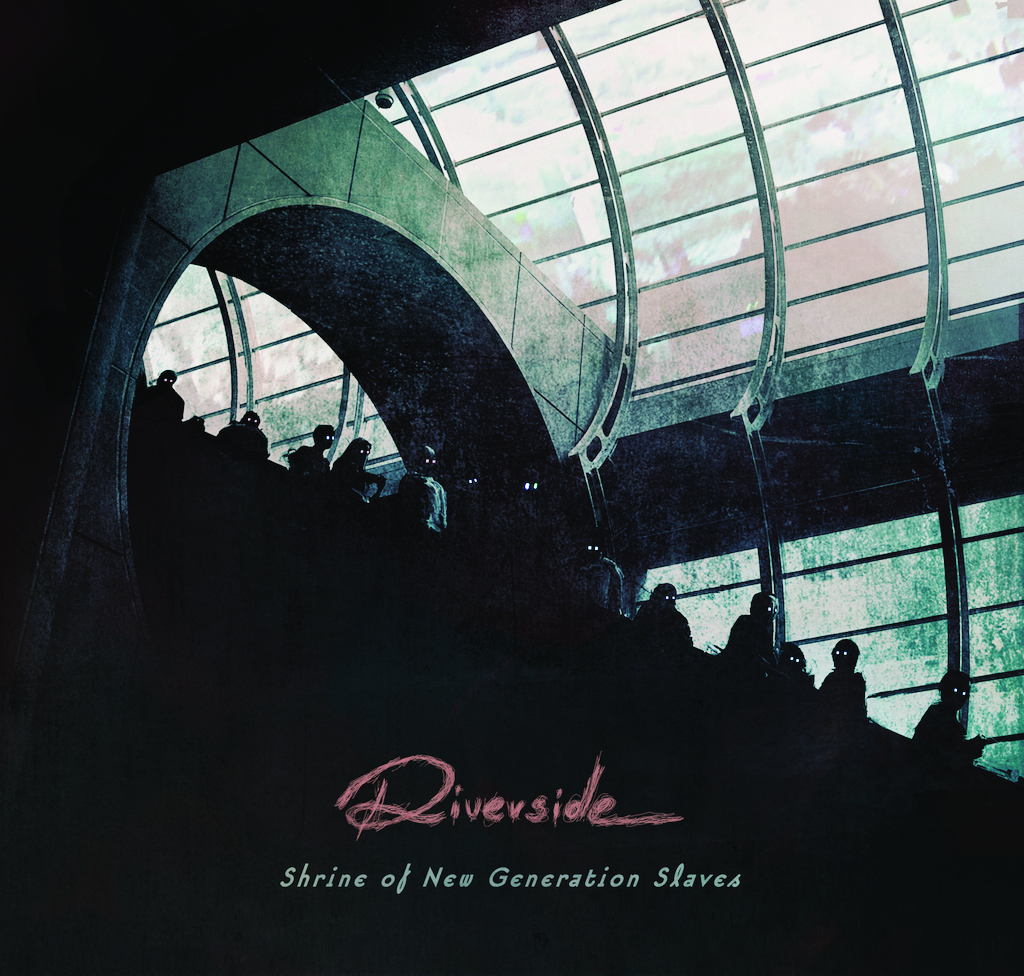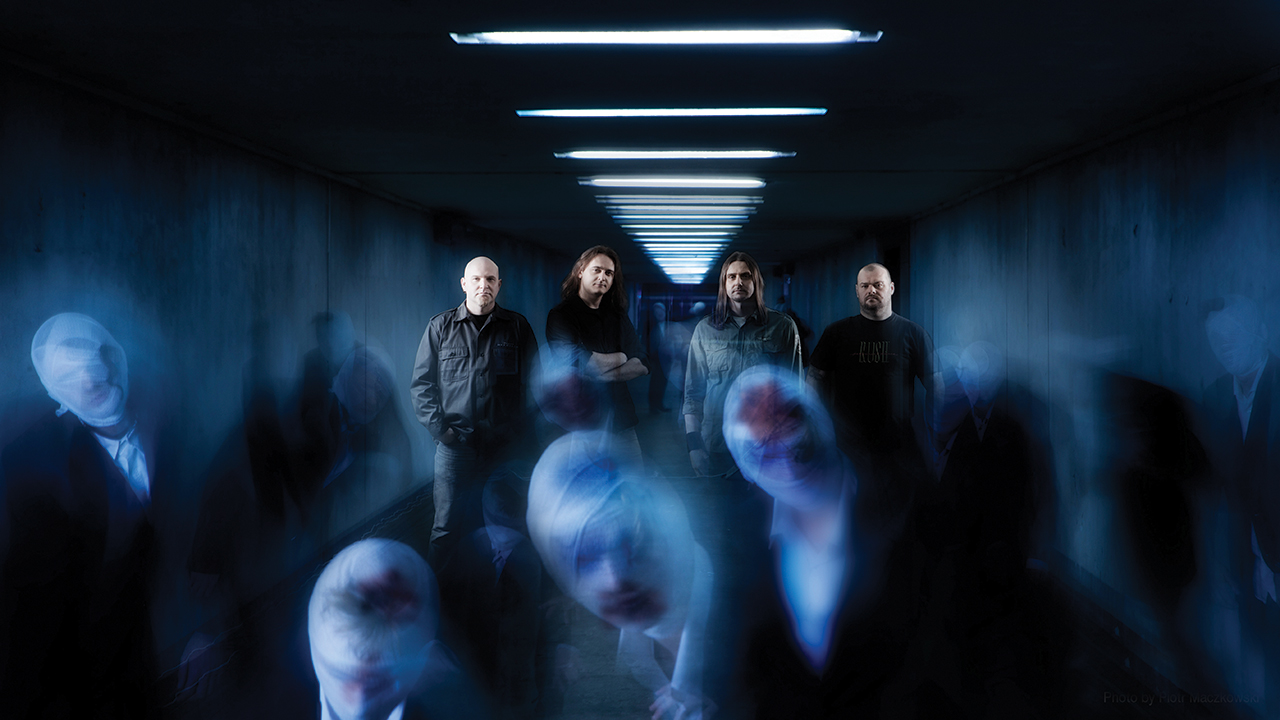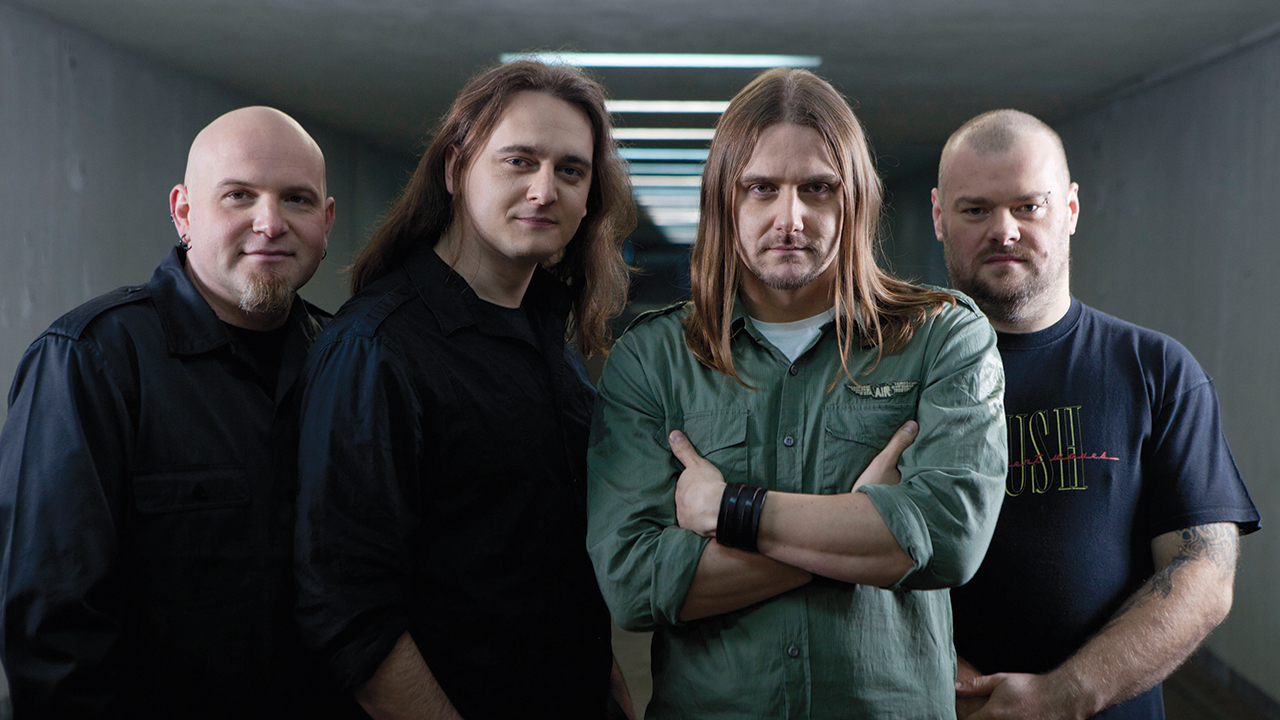Asuming that the ancient Mayans were talking complete gibberish and we haven’t all been obliterated before this sentence hits the page, the stresses and strains of the modern age continue to loom large over our everyday lives. While there is plenty of succour to be found within the vast amounts of glorious music being made, not least in the progressive rock world, it is sometimes hard to shake off a sense of debilitating ennui as mankind trudges inexorably towards self-destruction or, at the very least, self-inflicted chaos. As a result, the latest album by Riverside, Poland’s undisputed kings of prog, seems like a very welcome and thoroughly absorbing encapsulation of modern life’s dark shadows.
The follow-up to 2009’s extraordinary Anno Domini High Definition, Shrine Of New Generation Slaves is an album that is guaranteed to delight fans of both old and new prog, while giving our dormant grey matter a much-needed prod with subject matter that touches thoughtfully upon the pros and cons of modernity.
“The song New Generation Slaves mostly came from a journey I had with a taxi driver,” says Mariusz Duda, frontman and chief creative driving force behind the band he formed in Warsaw in 2001. “I spent about 40 minutes listening to him complaining about life, how unhappy we all are, how unhappy he was that he has to do this job. I said, ‘Why don’t you do something else?’ and he said ‘No, I can’t!’ I said, ‘Why can’t you?’ and he said it wasn’t possible. It made me realise that people feel they just can’t change things in their lives. For Christ’s sake, find yourself a hobby! You have a job you hate but you need to earn money, so do something in between that makes you happy. Play tennis. Watch horror movies. Whatever! I don’t understand it, maybe because I’m lucky and I do what I love for a living. But people feel like slaves. They have to do something they hate and they can’t take control of their lives.”

By far the most diverse and dynamic Riverside album to date, Shrine Of New Generation Slaves is a veritable treasure trove of melody, atmosphere and complexity, with everything from futuristic synths to old school Hammonds and Moogs facilitating the telling of Mariusz’s cautionary tales. Although not a concept album in the traditional sense, the songs are clearly linked together with a sense of modern day disquiet, as the Poles refine and redefine their fervently adventurous sound.
“It’s not a concept album but all the tracks are connected to the same subject,” says Mariusz. “The first track is about complaining, Celebrity Touch is about celebrity and being addicted to that feeling of importance, We Got Used To Us is about relationships and Deprived [subtitled Irretrievably Lost Imagination] is about how in the past you could use your imagination much more than you can now. Imagine driving without GPS today! Overall, it’s a sad record, I think. When I brought the master home, my wife listened to it and she said, ‘It’s good, but it’s so fucking depressing!’ But there is hope at the end too. There is a light at the end of the tunnel.”
Major players in European prog since the release of their second album Second Life Syndrome in 2005, Riverside may not have quite conquered the world but the new album could hardly be more perfectly pitched and paced for contemporary tastes. Originally inspired by prog legends like Genesis, Rush and Marillion, via Mariusz’ own predilection for 70s electronic music like Tangerine Dream and Jean-Michel Jarre, the band have steadily evolved over the last decade, becoming the closest thing that Poland have to Porcupine Tree-like prog overlords in the process. Thanks in part to the diversity of members’ background – at least half of their number cut their teeth playing in extreme metal bands – Riverside manage to straddle several points along the rock continuum while purposefully steering clear of the kind of well-worn clichés that condemn many bands to be too easily pigeonholed.
“Before I started my first band, there were bands like Krzak, post-Camel bands, art rock bands, and that was kind of popular in Poland, but in the next decade there was nothing. Just silence!” says Mariusz. “In the 90s it was only Porcupine Tree and nothing more. I knew about Dream Theater but I wasn’t really into that kind of metal. Somehow our background connected us with the metal scene, but we weren’t a prog metal band. There were metal elements and people seemed to like that, but there seems to have been a little prog revolution in Poland since then and a lot of bands have appeared from all over.”
Perhaps in spite of all the political and social upheaval that has taken place in Poland over the last few decades, the country remains a fertile breeding ground for the arts. The progressive rock scene may have undergone a somewhat erratic evolution between the emergence of first wavers like SBB through to today’s populous upsurge, but Riverside are the one band that have truly capitalised on their home nation’s appetite for intriguing music, even scoring major chart success with Anno Domini High Definition, which hit the Number One spot in the Polish charts back in 2009.
“But we were only Number One for two weeks because Michael Jackson died, unfortunately!” Mariusz laughs. “Otherwise we might have been there even longer. But it was a huge surprise for us. There were no radio tracks on that album. It was strange and progressive. I wanted to find a place between something ambitious and melodies that you might find in pop music. That has always been my adventure, so to speak. In the 90s, I was hugely inspired by P-Tree's The Sky Moves Sideways. I love that mixture of simplicity and complicated ideas, like Marillion's Fugazi. People were able to find the melodies on Anno Domini… and it was successful, although we were still surprised and very happy!”

Four years on from conquering the charts at home, Riverside are still gaining momentum and look certain to enjoy their most successful year to date as Shrine… is unveiled and the ever-expanding prog legions embrace it with alacrity. Mariusz is philosophical about the cult status his band has enjoyed up until this point, but he also seems to be full of optimism about where this new record will take them, not least because after a decade of hard work, he finally feels that Riverside have made an album worthy of the world’s attention.
“So far, we’d always had good ideas but somewhere in between you could find something amateurish in there,” he says. “Whether it was in the production or the songwriting, everything wasn’t quite right. I learnt a lot from making my solo albums [under the Lunatic Soul banner] and I said to the rest of the band that I’d like to focus more on the production this time and on focusing on what we want to be. We are a band, but I asked for the final vote on everything so I could keep hold of the direction I wanted to follow. I wanted to keep the normal, simple songs, but there’s something more there and a depth that I probably lost on previous albums. For the first time I achieved what I wanted to achieve.”
Having only ventured outside of Poland a handful of times over the last decade, Mariusz and Riverside are eager to throw themselves into the task of spreading their sonic gospel across the globe this time around. With UK and European dates already booked for 2013, not to mention a debut headlining jaunt across the United States, the band are plainly confident that Shrine… is the album to enable them to scale the prog ladder and reap the rewards of all their hard work. We may live in a world that prizes mindless distraction over spiritual development and cheap media fixes over true cultural enrichment, but the existence of music with this much passion, spirit and imagination suggests that maybe there is cause for a little optimism too.
“I think if you grade the albums out of six, all of our previous albums have been a four or a four-plus, but this one is a five!” Mariusz laughs. “It’s a good album and I’m really happy with it. If a lot of people love it then I’ll say, ‘Woohoo!’ but if everyone says that they think it definitely sucks then maybe I should concentrate on Lunatic Soul or some different work, but I think we’re okay! I can listen to this album myself and it’s a pleasure to hear it. I think I finally got the combination right and it could appeal to progressive fans as well as my mum!”
This article originally appeared in issue 33 of Prog Magazine.

